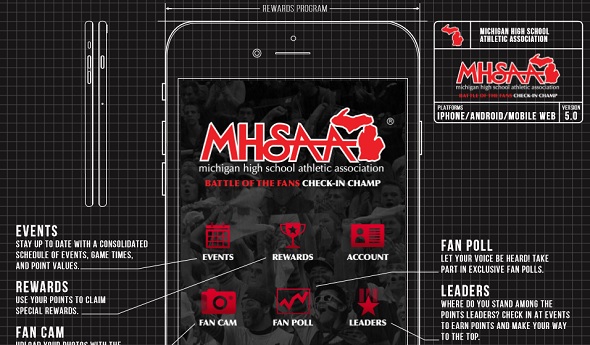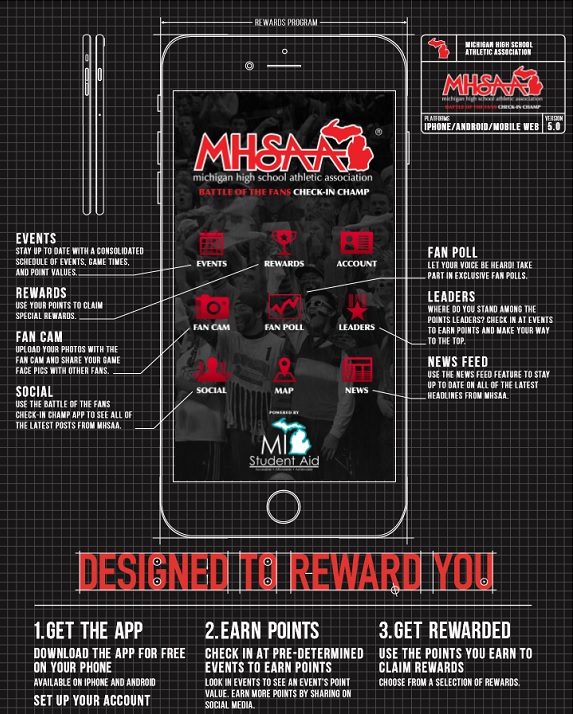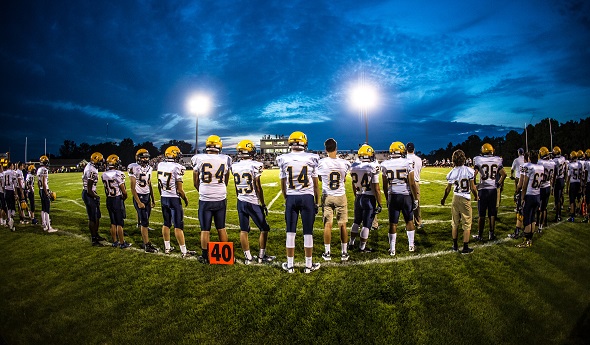
'Check-in Champ' App Rewards Fans
January 10, 2017
By Geoff Kimmerly
Second Half editor
The Michigan High School Athletic Association and SuperFanHigh, a leading fan loyalty and engagement company, have launched a mobile app that will allow students, faculty, alumni, community members and all fans to earn prizes and college scholarships by showing support for high school basketball teams.
To participate, fans simply need to download the “Check-in Champ” app for free from the Apple iTunes or Google Play online stores and then check in at high school girls and boys basketball games they are attending this season. SuperFanHigh will track these check-ins and provide standings of fans who attend the most events statewide beginning Tuesday, Jan. 10. Fans “checking in” accrue points toward prizes including a total of $5,000 in college scholarships sponsored by MI Student Aid.
“The ‘Check-in Champ’ contest provides an exciting opportunity for our schools to promote their regular-season girls and boys basketball games,” MHSAA Executive Director John E. “Jack” Roberts said. “We’re eager to see how this will build more excitement at games, both during the regular season and the MHSAA tournament, and we’re appreciative of MI Student Aid for adding significant incentive for students and their families who support their classmates and communities.”
For the remainder of this Michigan high school boys and girls basketball season, fans who attend games will earn points. When registering on the app, fans must select their favorite school. Schools will be divided by Class: A, B, C and D. A $3,000 scholarship will be awarded to the fan who earns the most points overall across all four classes, and $500 scholarships will be awarded to fans who earn the most points in each class.
Only student fans will be eligible to use the college scholarships; however, fans who are not students may still compete for the scholarships and designate them for specific students should they win the contest. All fans, including those who are not students, will be able to earn app “badges” as they accrue points, and the top 100 point-getters will receive shirts printed to celebrate their accomplishment in the contest.
“We are excited about partnering with the MHSAA to launch this new app,” said Anne Wohlfert, Director of the Student Financial Services Bureau at the Michigan Department of Treasury. “We are pleased to offer $5,000 in scholarship dollars to the students who attend the most games. This joint venture aligns with our goals to provide high school students and their families with student financial resources and information.”
The app provides other information for students and fans including their selected schools’ boys and girls basketball team schedules, MHSAA news and an opportunity to share photos through a ‘fan cam.’ Participants may accrue bonus points by answering MHSAA basketball trivia questions and promoting their “check-ins” on social media.
SuperFanHigh is a division of its parent company, SuperFanU and provides fan experiences for more than 300 high schools and colleges/universities across the country. The company is leading the market in developing innovative platforms that allow the communication and marketing between students/fans and schools to be more engaging and efficient.
“We know that our partnership with MHSAA will yield lots of excitement this year across the state of Michigan,” says Kayla Mount, co-founder and COO of SuperFanU.


MHSAA Opposes Big Ten Friday Football
November 2, 2016
By Geoff Kimmerly
Second Half editor
The executive director of the Michigan High School Athletic Association said today that he is “disappointed and disheartened” by the Big Ten Conference announcement that it will play and televise football games on Friday nights beginning with the 2017 season.
Friday night football remains one of the strongest and longest-standing traditions in high school athletics, and the MHSAA has fought since the start of this century to keep Friday nights sacred against the overstepping of college football and the damage televised Big Ten games are now expected to cause to attendance and media coverage of the sport at the high school level.
MHSAA Executive Director John E. “Jack” Roberts was contacted by both Big Ten Conference commissioner Jim Delany and Michigan State University athletic director Mark Hollis before the decision was announced. Roberts said he is appreciative of Michigan State and University of Michigan’s low tolerance to be included in this venture – at most, both will host a Thursday or Friday night game during Labor Day weekend and play one Friday night away game during the remainder of a season – but remains frustrated that similar respect for high school football was not shown by the conference as a whole.
Michigan State has played Friday night games during Labor Day weekend the last six seasons, hosting five and playing at Western Michigan University in 2015. However, most Michigan high school games continue to be scheduled and played on the Thursday before Labor Day, relieving holiday travel conflicts in most communities. University of Michigan did play on the Thursday before Labor Day at University of Utah in 2015, but has not played on a Friday night of Labor Day weekend this decade. The Wolverines are one of five Big Ten schools without a Friday night game in 2017.
“We are saddened by this decision. We had hoped that the Big Ten Conference would stay above this. We think this cheapens the Big Ten brand,” Roberts said. “Fans won’t like this. Recruits won’t like this. And high school football coaches won’t like this.
“We are grateful that Michigan State University and the University of Michigan are trying to minimize the effects of this decision by the Big Ten. But overall, this is just the latest step by major college athletics in the pursuit of cash that is just crushing high school sports.”
The MHSAA has shown its opposition to the use of Friday nights for televised collegiate football games for more than 15 years, dating back to 2001 when the NCAA lifted its restrictions on Friday night telecasts, which at first led to the broadcasting of “mid-major conference” games on the same night traditionally reserved for high school athletes.
The MHSAA launched in 2001 its “Save Our Friday Nights” campaign to emphasize the role that Friday night high school athletic events play in communities and to rally MHSAA member schools to contact NCAA member school football coaches, athletic directors and conference commissioners to voice their concerns.
In addition to causing lower attendance at events going up against Big Ten football games, Roberts anticipates that Friday night college games also will leave high school football as a secondary priority in many media markets. More than 80 radio stations statewide cover high school games regularly, but many also carry Michigan State or University of Michigan football. High school football could lose significant time on local TV highlights shows and in print and online coverage as well, as resources are diverted to cover a college game – potentially quieting significantly the positive buzz that comes from the typical high school football Friday night.
“Everyone knows that football is struggling right now,” Roberts said. “It’s getting a lot of bad publicity. Participation is declining. And now this; there couldn’t be worse timing.”
PHOTO: Grand Ledge takes on Okemos under the Friday night lights this season. (Click to see more from HighSchoolSportsScene.com.)

